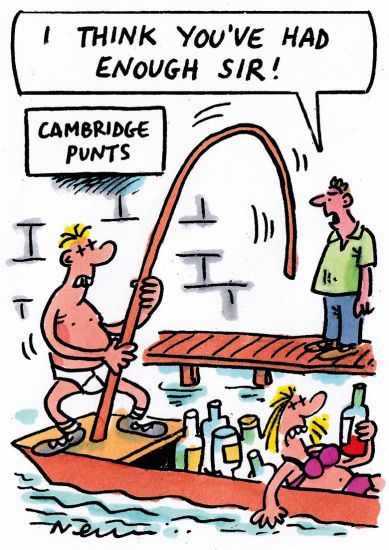
Is Cambridge about to face another year of town-gown acrimony over student activities on the River Cam? First there was uproar over drunken celebrations during the traditional end-of-exams “Suicide Sunday” party when students stripped to their underwear and frolicked in the water. Then fury erupted over close-up photos in The Sun on 13 June that appeared to show a college rowing crew “decapitating” a duckling with their oars in the run-up to the annual Bumps race. University authorities will hope that they don’t see a repeat of the saga surrounding the tearaway swan known as Mr Asbo, which pitted wildlife-loving locals against the university’s boating community – with one incensed houseboater even challenging a college crew to a cage fight over their alleged mistreatment of birdlife.
A Chinese university is hoping to “encourage good study habits” by monitoring its entire campus using surveillance cameras, The Guardian reported on 16 June. Every area of Wuchang University of Technology’s 181-acre campus, including its classrooms and student dormitories, are now reportedly covered by CCTV watched by a 100-strong team of officials, according to a report on the local news site cnhubei.com, the paper said. “Playing with phones, napping or chatting during class have virtually disappeared,” said one university employee on the impact of the 6 million yuan (£645,000) camera system. But some female students have “expressed unease” about the surveillance of living quarters at the university in Wuhan, in central China. “Can I suggest installing surveillance cameras in the bedrooms of the university’s president and [Communist] party secretary?” said one Weibo user.
The Higher Education Policy Institute reacted angrily to news that CentreForum, formerly a Liberal Democrat thinktank, had changed its name to the Education Policy Institute as it takes on a new “mission” under executive chairman and former schools minister David Laws, who lost his seat as a Lib Dem MP at the general election. Nick Hillman, Hepi director, told Times Higher Education on 15 June that it “beggars belief that CentreForum were unable to come up with an original new name rather than pinching three-quarters of ours. I hope their research is more original than their naming policy.” Mr Laws said: “We are confident that the names are sufficiently distinct and we have worked hard to make sure there won’t be any confusion between Hepi and the Education Policy Institute.” This thinktank battle may intensify if the EPI comes within range of Hepi’s guns at any higher education events – it sounds as though Mr Hillman’s acronym acrimony could pierce armour from three miles.
The promise by Vote Leave that there will be “more than enough money” to ensure that higher education does not lose out in the event of Brexit cut little ice with universities in the final days before polling day for the European Union referendum. The letter, signed by 13 senior Conservatives and published on 14 June, promised to “continue to fund EU programmes in the UK until 2020”, but Universities UK quickly responded by saying that “EU support…goes far beyond money”. However, it was the letter’s quotation of Sir Andre Geim’s Nobel lecture in which he explained he could “offer no nice words” for the “unnecessarily bureaucratic” system of EU framework funding that looked like it really backfired. Experts pointed out that the letter’s quotation of Sir Andre had removed the words “except for the European Research Council”. Indeed, Geim and his research partner Sir Konstantin Novoselov have received about €12 million (£9.5 million) from the ERC for their Nobel prizewinning work on graphene at the University of Manchester.
With the “based on real life events” poltergeist movie The Conjuring 2 riding high at the US box office, many moviegoers have been persuaded that such hauntings do really happen. So it’s good to have a university-based “ghost buster” on hand to debunk a few paranormal myths, particularly around the 1970s so-called Enfield Poltergeist incident that inspired the latest Hollywood hit. Chris French, a psychologist at Goldsmiths, University of London, who heads the Anomalistic Psychology Research Unit, told Time Out on 17 June why the famous haunting of twin sisters in a North London council house was a hoax. Professor French explained how it was probably a “schoolgirl prank that got out of hand”, adding that the classic photo of 11-year-old Janet Hodgson levitating above her bed could easily have been her jumping up and down. “There is lots of evidence to suggest she’s not hovering in mid-air,” said French, who likes to describe his work as dealing with the “psychology of weird shit”.
Register to continue
Why register?
- Registration is free and only takes a moment
- Once registered, you can read 3 articles a month
- Sign up for our newsletter
Subscribe
Or subscribe for unlimited access to:
- Unlimited access to news, views, insights & reviews
- Digital editions
- Digital access to THE’s university and college rankings analysis
Already registered or a current subscriber? Login


